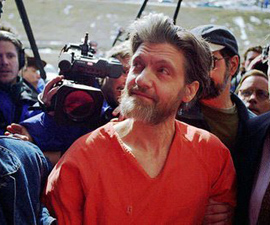The Chronicle of Higher Education has a sort-of interesting article titled "The Unabomber's Pen Pal" that is about a college professor trying to teach the anti-technology ideas espoused by Ted Kaczynski among others (but especially by him). This professor seeks to remove from the remote Montana cabin and the remote mind of its terrorist author the ideas captured in Kaczynski's manifesto and resituate them in the academy. Apparently it often turns out that exploring the ideas on their own merit takes a backseat to discussing the practicality and ethics of doing so.
Within contemporary literary theory, can the text be removed from its author? How did the author get "into" the text in the first place?
And should he be removed? Is this a special kind of work? A unique case?

Kaczynski lived his ideology and practiced his philosophy. In one sense, by removing the author from the text, the professor is attempting to protect the text, give it viability in the marketplace of ideas. But at the same time, without its author, the text is deprived of the life Kaczynski lived in its manifestation--the life it advocates for, the revolution it endorses: all that is locked away, isolated, imprisoned so as not to threaten its academic life.
To wit, Kaczynski is first locked away so as not to threaten society; then he is locked away a second time so as not to threaten his own ideas. Indeed, the text is freed the moment its author is imprisoned.
"Kaczynski" is now an abstraction of the man who attacked society by sending bombs through the mail while hidden in a remote Montana cabin. When the name is attributed to the text, "Kaczynski" appears in faded print in its margins, and can be found scratched in between the lines, where it adds or invokes a certain character in the work. This character says, Yes, these words are dangerous, these words are of consequence to you and to the establishment. These are fighting words.
This is not to say you can't or shouldn't remove the author from his text (in a sense I'm all for it). It's just that, given the current practice of (critical) literary theory, if you try, you might expect the text to change. After all, the fact that the professor consciously has to remove the author, and that the Chronicle wrote about his trying to do so, shows current theory's unrelenting emphasis and reliance on the author function.
